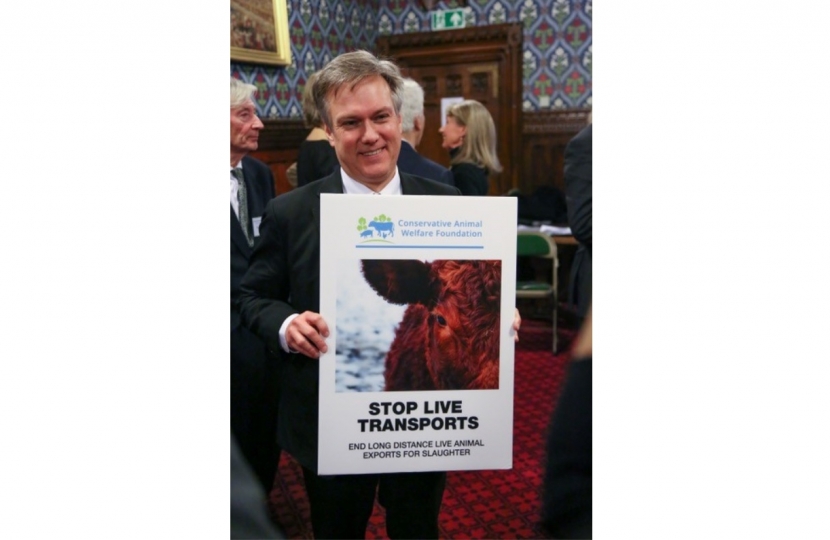
Henry Smith MP has warmly welcomed Government plans to end the live export of animals for slaughter.
The Crawley MP has campaigned on this issue for many years, with UK ministers able to do little about it under European Union rules. Live animals often have to endure excessively long journeys during exports which cause distress and injury.
Previously, EU rules prevented any changes to these journeys, but Brexit enables the UK Government to pursue plans which would prevent unnecessary suffering of animals during transport, and sees this country become the first in Europe to end the practice.
Henry said;
“The announcement of a consultation with an aim to ban live animal exports on Brexit is yet more welcome welfare development, possible as we leave the EU and another clear commitment from this Government to secure greatly enhanced protections.
“It’s almost eight years to the day since I spoke in the House of Commons about this issue for the first time. It’s clear that this Government not only cares deeply about animal welfare but has a plan to strengthen protections.”
The Government is also consulting on proposals to further improve animal welfare in transport more generally, including reduced maximum journey times, animals being given more space and headroom during transport, stricter rules on transporting animals in extreme temperatures, and tighter rules for transporting live animals by sea.
Lorraine Platt, Founder of the Conservative Animal Welfare Foundation, commented;
“We are honoured to have Henry Smith MP as our Patron and are grateful to Henry for all his important work over the years to help end live exports.
“Henry is highly active on animal welfare issues and was the driving force to introduce mandatory CCTV in all slaughterhouses legislation. He also champions the campaign to ban cruel foie gras imports into the UK. We look forward to continuing to work together to help advance animal welfare.
“The announcement of a consultation with an aim to ban live animal exports is welcome. Animals should not be subjected to long gruelling journeys for slaughter and fattening. It is high time for these heartless exports to end. The vast majority of the British public would prefer British farm animals to be slaughtered in the UK and exported as meat, and many find the export of British farm animals to other countries to be reared under conditions illegal in the UK unacceptable.
“It is clear that ending live exports will have huge welfare benefits for the animals who experience this horrific practice. Shorter transport times mean that they will be less at risk of the potentially severe harms faced by transported animals due to stress, injury, disease and maltreatment. Moreover, these animals will no longer be at the mercy of other countries’ welfare laws and practices during raising and slaughter, which may be significantly worse than our own. Once abroad, animals are no longer under UK jurisdiction, which is much more welfare friendly than other neighbouring countries.”
The Secretary of State for Environment, Food & Rural Affairs, George Eustice, said;
“We are committed to improving the welfare of animals at all stages of life. Today marks a major step forward in delivering on our manifesto commitment to end live exports for slaughter.
“Now that we have left the EU, we have an opportunity to end this unnecessary practice. We want to ensure that animals are spared stress prior to slaughter.”
The announcement from Government on this issue represents the latest policy victory for Crawley’s MP. The extension of the Coronavirus Job Retention Scheme and the introduction of the COVID-19 passenger testing regime for international arrivals into England came following intense lobbying from the town’s representative in Parliament.
The Department for Environment, Food & Rural Affairs consultation ‘Improvements to animal welfare in transport’ is open until 28th January 2021. Please click here for more information and to make a submission.
Picture: Henry Smith MP at a Conservative Animal Welfare Foundation event which called for an end to live animal exports, January 2018.


